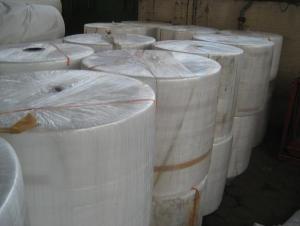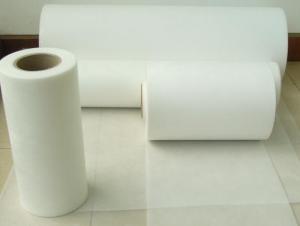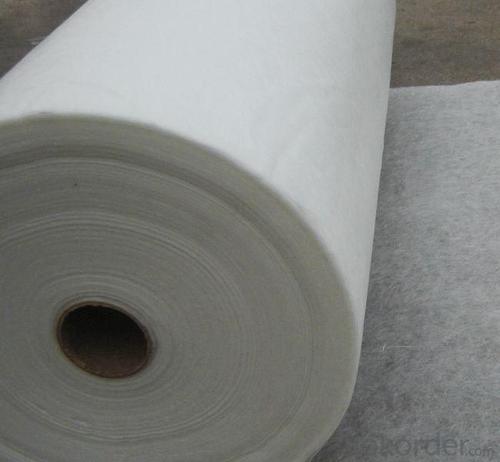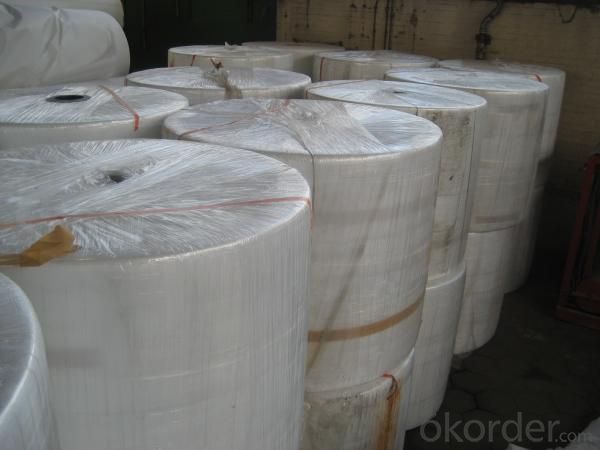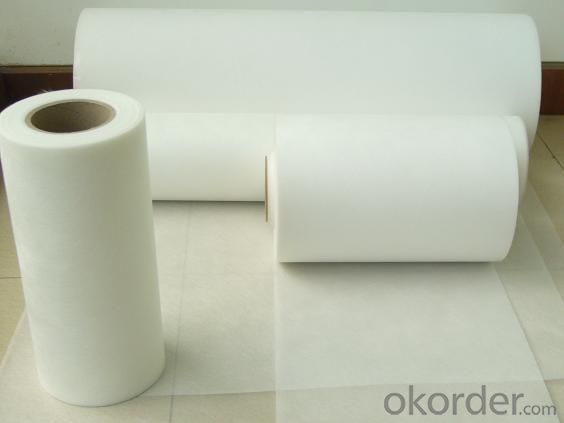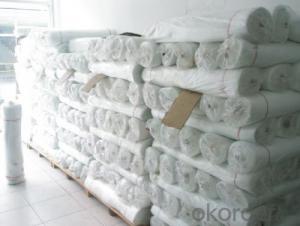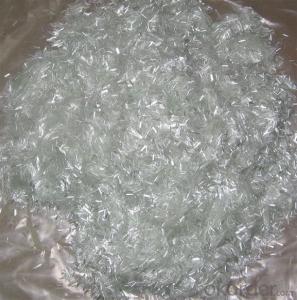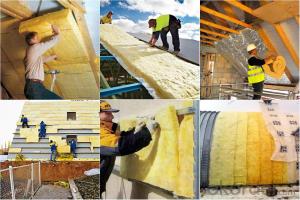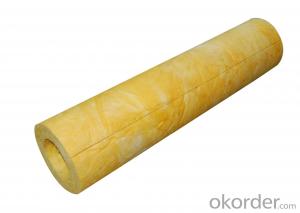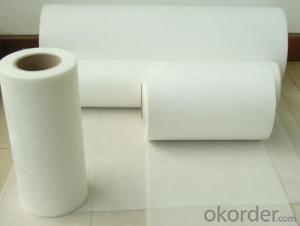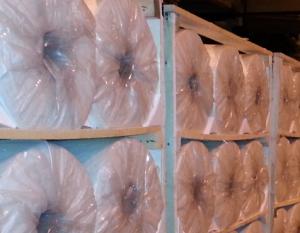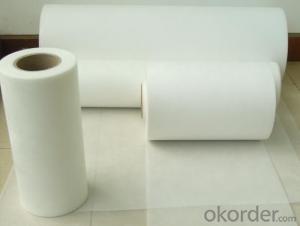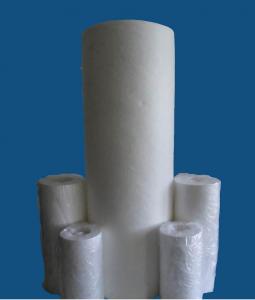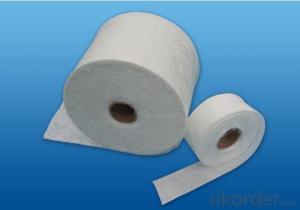Fiberglass Mat Tissue Mat
- Loading Port:
- China Main Port
- Payment Terms:
- TT or LC
- Min Order Qty:
- 2000Square Meter m²
- Supply Capability:
- 60000 Square Meter Per Month m²/month
OKorder Service Pledge
OKorder Financial Service
You Might Also Like
Packaging & Delivery of Tissue Mat
| Packaging Detail: | Carton |
| Delivery Detail: | 20Days |
Specifications of Tissue Mat
GSM: 20g/m2 to 280g/m2
Wdith: 1m to 2.1m
Max Roll Length: 3800m/Roll
Characteristics of Tissue Mat
It is made with water-dispersed chopped strands by wet technic and has being our strong product for export in the past decade. The width of finished product is 1m, 2m or 2.06m and length is 50m, 100m, 300m, 500m, 1500m, 2800m, 3600m, 3700m, or 3800m/roll. We also can cut it into the tape of width 30mm, 50mm, 100mm or 200mm and length 25m or 100m/roll. The area weight is 20g/m2, 25g/m2, 30g/m2, 45g/m2, 50g/m2, 60g/m2, 70g/m2, 80g/m2, 90g/m2, 100g/m2, 260g/m2 or 280g/m2.
As per clients’ application, we also can supply the following products.
1.fiberglass roofing tissue with or without 66 yarns (45g/m2, 50g/m2, 60g/m2, etc)
2.fiberglass surface tissue for FRP products
3.fiberglass tissue for pipe wrapping
4.PVC floor tissue (such as 40g/m2 x 2.06m width x 2800m/roll)
5.Fiber glass mat (CCL CEM-3 using)
6.AGM battery separator tissue
Meantime, we also can process some new products as per clients’ specical requirement, pls. see them as follows:
1.colorful tissue (yellow, red, blue, etc)
2.fiberglass tissue with one side coating of cement (the base tissue is 30g/m2~45g/m2 and coating is 15g/m2. The finished product is fire-proof and heat-resistant).
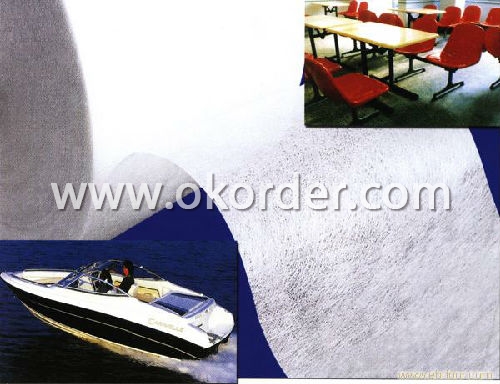
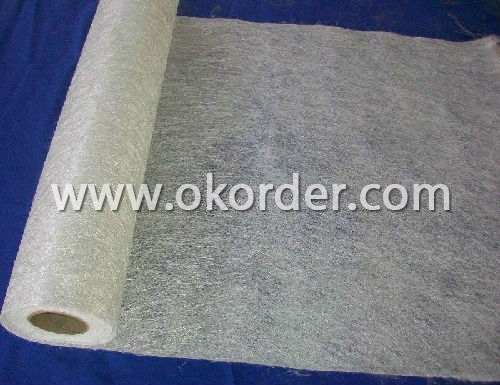
- Q: What is the expected lifespan of fiberglass mat tissue in power generation applications?
- The expected lifespan of fiberglass mat tissue in power generation applications can vary depending on various factors such as the specific application, environmental conditions, and maintenance practices. However, fiberglass mat tissue is known for its durability and longevity, making it a popular choice for power generation applications. In general, fiberglass mat tissue can have an estimated lifespan of 20 to 30 years in power generation applications. This is due to its excellent resistance to corrosion, heat, and chemicals, which are commonly encountered in power generation facilities. Fiberglass mat tissue is also capable of withstanding high mechanical stress and can retain its structural integrity over a long period of time. However, it is important to note that the lifespan can be influenced by factors such as exposure to extreme temperatures, humidity, and chemicals, as well as the frequency and quality of maintenance and inspections. Regular inspections and proper maintenance can significantly extend the lifespan of fiberglass mat tissue in power generation applications. It is recommended to consult with manufacturers and industry experts to determine the specific expected lifespan of fiberglass mat tissue based on the particular power generation application and operating conditions.
- Q: What is the tear resistance of fiberglass mat tissue?
- The ability of fiberglass mat tissue to withstand tearing or ripping when exposed to mechanical stress or force is referred to as its tear resistance. Due to its strong and durable nature, fiberglass mat tissue is renowned for its high tear resistance. This tear resistance is typically quantified and reported as tear strength, which measures the force needed to tear the material. The determination of tear strength involves standardized testing methods like the Elmendorf tear test or the tongue tear test. Various factors, including thickness, density, and composition, can influence the tear resistance of fiberglass mat tissue. Nevertheless, fiberglass mat tissue generally exhibits outstanding tear resistance properties, making it an excellent choice for applications where durability and strength are crucial, such as in the construction industry for reinforcement materials or in the production of composite materials.
- Q: Is fiberglass mat tissue safe to handle?
- Yes, fiberglass mat tissue is generally safe to handle. However, it is important to take certain precautions when handling fiberglass to minimize any potential risks. Fiberglass mat tissue is made up of fine fibers of glass, and if not handled properly, these fibers can become airborne and may cause irritation to the skin, eyes, and respiratory system. To ensure safety, it is recommended to wear personal protective equipment such as gloves, safety goggles, and a dust mask when handling fiberglass mat tissue. This will help prevent direct contact with the skin, eyes, and inhalation of any loose fibers. It is also advisable to work in a well-ventilated area to reduce the concentration of airborne fibers. In addition, it is essential to handle fiberglass mat tissue with care to prevent any physical injuries. The fibers can be sharp and may cause cuts or abrasions if mishandled. It is advisable to use appropriate tools and techniques to cut, shape, or manipulate the material. Furthermore, it is important to follow proper disposal guidelines for fiberglass waste. Avoid sweeping or vacuuming the area where fiberglass mat tissue has been handled, as this can disperse fibers into the air. Instead, use damp cleaning methods or specialized vacuum cleaners with HEPA filters to contain the fibers and reduce the risk of exposure. By following these safety precautions and handling guidelines, the risks associated with fiberglass mat tissue can be effectively minimized, ensuring safe handling and use of the material.
- Q: What is the flexibility of fiberglass mat tissue at low temperatures?
- The flexibility of fiberglass mat tissue at low temperatures is generally maintained, as fiberglass has low thermal expansion and contraction properties, allowing it to retain its flexibility even in cold conditions.
- Q: How does the strength of fiberglass mat tissue compare to other reinforcement materials?
- The strength of fiberglass mat tissue is comparable, if not superior, to other reinforcement materials. It offers excellent tensile strength, high resistance to corrosion, and good thermal insulation properties. Additionally, it is lightweight, flexible, and cost-effective, making it a popular choice in various industries such as construction, automotive, and aerospace.
- Q: What is the expected lifespan of fiberglass mat tissue in outdoor applications?
- The expected lifespan of fiberglass mat tissue in outdoor applications can vary depending on several factors such as exposure to weather conditions, maintenance, and quality of the material. However, on average, fiberglass mat tissue can last for approximately 20 to 30 years when properly installed and maintained.
- Q: Can fiberglass mat tissue be used for reinforcing pipes?
- Yes, fiberglass mat tissue can be used for reinforcing pipes. It provides strength and durability to the pipe structure, making it resistant to cracks and leaks.
- Q: How is fiberglass mat tissue bonded to surfaces?
- Fiberglass mat tissue is typically bonded to surfaces using a combination of adhesive and pressure. The adhesive, commonly a resin or epoxy, is applied to the surface and then the fiberglass mat tissue is pressed onto it. This ensures proper adhesion and allows the mat tissue to conform to the surface contours. Once bonded, the adhesive is cured to permanently bond the fiberglass mat tissue to the surface.
- Q: Can fiberglass mat tissue be used for insulating metal buildings?
- Fiberglass mat tissue is indeed capable of insulating metal buildings. This lightweight and flexible material offers efficient thermal insulation for metal structures. It is frequently applied as a layer between the metal panels and the interior of the building, effectively hindering heat transfer and enhancing energy efficiency. Moreover, fiberglass mat tissue resists moisture and discourages the growth of mold or mildew, making it an excellent option for insulating metal buildings. Nevertheless, it is crucial to ensure correct installation in order to optimize its insulation capabilities and avoid any gaps or air leakage.
- Q: Can fiberglass mat tissue be used for repairing fiberglass RVs?
- Yes, fiberglass mat tissue can be used for repairing fiberglass RVs. Fiberglass mat tissue is a lightweight, flexible material that is commonly used for reinforcing and repairing fiberglass structures. It is designed to be easily molded and shaped to fit the contours of the damaged area, making it ideal for repairing RVs, which often have curved surfaces. To repair a fiberglass RV using fiberglass mat tissue, the damaged area needs to be cleaned and prepared by removing any loose or damaged fiberglass. The mat tissue is then cut to the appropriate size and shape to cover the damaged area. A suitable fiberglass resin or adhesive is applied to both the damaged area and the backside of the mat tissue. The tissue is then carefully placed over the damaged area and pressed down to ensure proper adhesion. Once the repair is complete, the fiberglass resin or adhesive is allowed to cure according to the manufacturer's instructions. After curing, the repaired area can be sanded, primed, and painted to match the rest of the RV's exterior. It is important to note that fiberglass mat tissue is typically used for smaller repairs and cosmetic damage. For larger structural repairs, it may be necessary to use additional reinforcement materials such as fiberglass cloth or woven roving. It is recommended to consult with a professional or refer to specific repair guides for detailed instructions on repairing fiberglass RVs.
1. Manufacturer Overview
| Location | Hebei,China |
| Year Established | 2008 |
| Annual Output Value | Above US$20 Million |
| Main Markets | Mid East;Western Europe:South Asian |
| Company Certifications | ISO9001:2000;ISO14001:1996;GB/T28001:2001 |
2. Manufacturer Certificates
| a) Certification Name | |
| Range | |
| Reference | |
| Validity Period |
3. Manufacturer Capability
| a) Trade Capacity | |
| Nearest Port | Tianjin |
| Export Percentage | 80% |
| No.of Employees in Trade Department | 350 People |
| Language Spoken: | English;Chinese;Korean |
| b) Factory Information | |
| Factory Size: | Above 100,000 square meters |
| No. of Production Lines | Above 12 |
| Contract Manufacturing | OEM Service Offered;Design Service Offered |
| Product Price Range | Average |
Send your message to us
Fiberglass Mat Tissue Mat
- Loading Port:
- China Main Port
- Payment Terms:
- TT or LC
- Min Order Qty:
- 2000Square Meter m²
- Supply Capability:
- 60000 Square Meter Per Month m²/month
OKorder Service Pledge
OKorder Financial Service
Similar products
Hot products
Hot Searches
Related keywords

